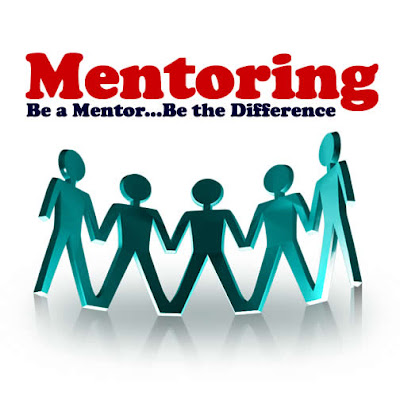Mentoring
As part of National Mentoring Month I am sharing information on a variety of different mentoring relationships. Today we will look at the mentoring relationship most people think of when they hear the work 'mentoring' ~ adults mentoring youth.
WHAT IS IT?
Mentoring--from the Greek word meaning enduring--is defined as a sustained relationship between a youth and an adult. Through continued involvement, the adult offers support, guidance, and assistance as the younger person goes through a difficult period, faces new challenges, or works to correct earlier problems. In particular, where parents are either unavailable or unable to provide responsible guidance for their children, mentors can play a critical role.
WHY ARE MENTORING PROGRAMS SO POPULAR?
The number of mentoring programs has grown dramatically in recent years. This popularity results in part from compelling testimonials by people--youth and adults alike--who have themselves benefited from the positive influence of an older person who helped them endure social, academic, career, or personal crises.
HOW DO THEY WORK?
Mentoring programs are established to match a suitable adult or older youth--the mentor--with a younger person. Potential mentors are recruited from various sources including corporate, professional, and religious communities, as well as neighborhood citizens. Nominations for mentors are sought formally and informally through flyers, posters, mailings, and word-of-mouth.
Appropriately matching mentors with youths is at the heart of all programs. Matching can be done formally and informally through interviews, personal profiles, comparative interest inventories, and get-acquainted sessions. In programs where mentors and youths are given a chance to choose each other, planned mentoring takes on many aspects of natural mentoring.
WHY ARE THEY NEEDED?
Data clearly show many youths have a desperate need for positive role models. The most compelling data describe changes to the American family structure: the number of single-parent homes has radically increased, as have two-parent working families. More preventive care is needed, as are support networks to fill the void left by busy or absent parents. Other statistics are equally troubling: each day in the United States, 3,600 students drop out of high school, and 2,700 unwed teenage girls get pregnant (Petersmeyer 1989).
WHAT ARE THEY FOR?
Mentoring programs generally serve the following broad purposes:
- Educational or academic mentoring helps mentored youth improve their overall academic achievement.
- Career mentoring helps mentored youth develop the necessary skills to enter or continue on a career path.
- Personal development mentoring supports mentored youth during times of personal or social stress and provides guidance for decision making.
Arlene Mark of New York City's I Have a Dream program observed, "We will only know who can be helped or what is the right kind of mentoring, when we try it." (Flaxman and Ascher 1992). Yet while research on the effects of mentoring is scarce, some studies and program evaluations do support positive claims (Flaxman 1992). In an evaluation of Project RAISE, a Baltimore-based mentoring project, McPartland and Nettles (1991) found mentoring had positive affects on school attendance and grades in English but not on promotion rates or standardized test scores. They concluded that positive effects are much more likely when one-on-one mentoring has been strongly implemented. Another evaluation (Cave and Quint 1990) found participants in various mentoring programs had higher levels of college enrollment and higher educational aspirations than nonparticipants receiving comparable amounts of education and job-related services (figure 1).
WHAT MENTORING PROGRAMS ARE AVAILABLE IN CACHE VALLEY?
There are several mentoring programs available here in Cache Valley to serve Cache Valley youth. Here is a list of those I am aware of:
TEAM Mentoring is a program designed to help high school students prepare for college.
Big Brothers Big Sisters is now being run by the USU Val R Christiansen Center and serves youth ages 6-17.
Options for Independence provides less structured, but very valuable mentoring opportunities for youth with disabilities.
I am not aware of other specific mentoring programs, but there are some good options for your youth to receive group mentoring through after-school programs. Check with your school to see what is available. There are also great opportunities for youth to receive mentoring through participation and leadership in various service groups. Contact me at Sharilee10@gmail.com if you would like to get your youth involved in leadership opportunities that will provide them with unofficial mentoring.
If you are aware of other official mentoring programs not listed here please be sure to let me know!
Sharilee Griffiths
Sharilee10@gmail.com


No comments:
Post a Comment